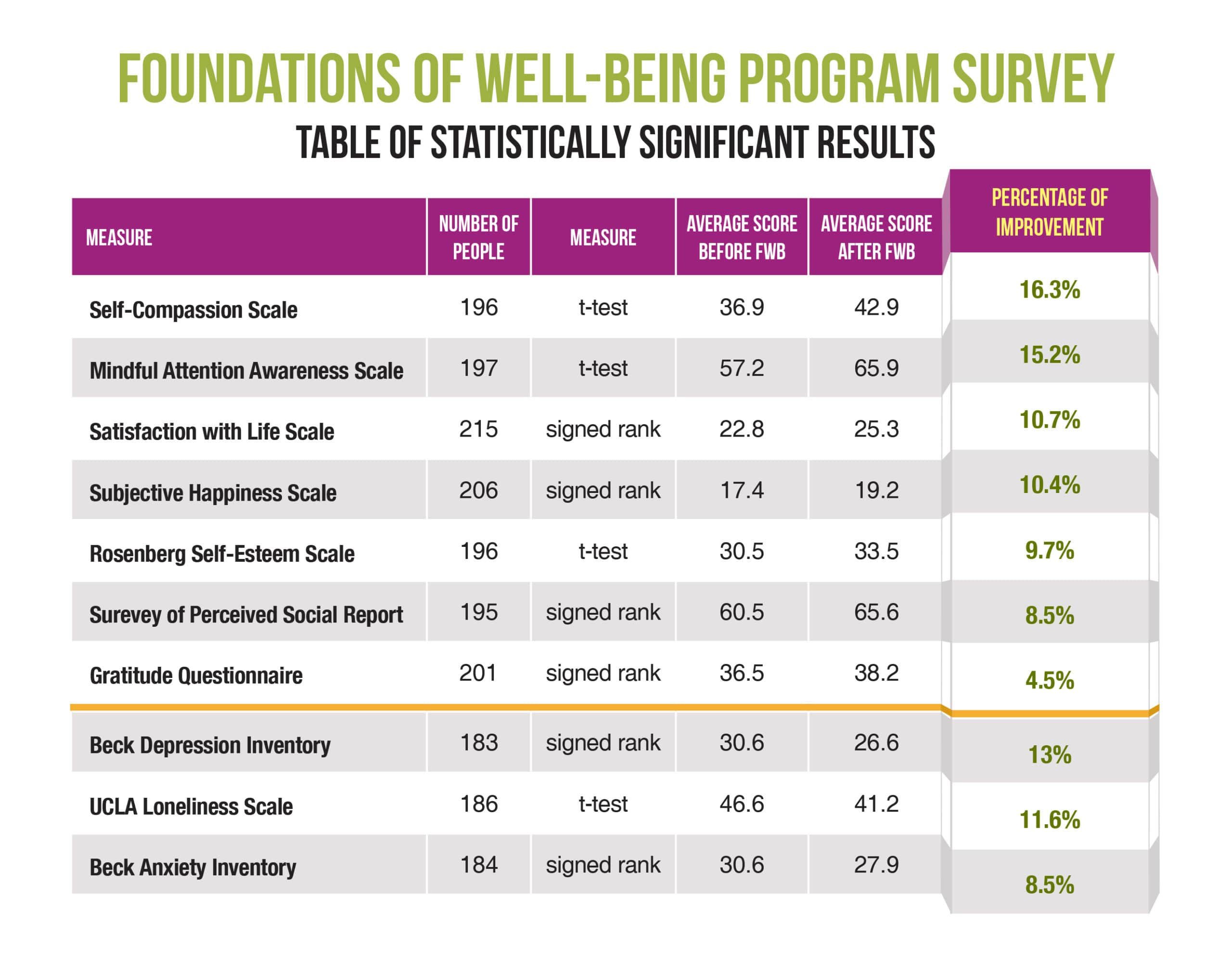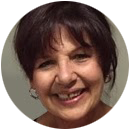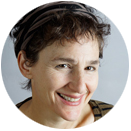The Foundations of Well-Being
— THE RESULTS ARE IN —
The Foundations of Well-Being
To get a sense of the potential benefits of the Foundations of Well-Being program, we sent out a voluntary survey to participants before they began the program and then many months later, so we could make “before” and “after” comparisons. The survey consisted of ten well-established psychological measures that are listed in the Table of Results, and it was analyzed with standard statistical methods.
In sum, participants reported significant improvements in every single area that we assessed.
In particular, they described becoming more mindful, self-compassionate, satisfied with life, and grateful, with increased happiness, self-esteem, and a sense of connection with others. They also reported less anxiety, loneliness, and depression.


“The Foundations of Well-Being has given me the resources, strength, and clarity to be an active participant in the obstacles that “come up” in life, as well as valuable tools to really let go of a lot of pain and unnerving, habitual self-torture.”
-Chris R

“After a trauma, I was in a very desperate place, and really struggling. After 12 months in the Foundations program, I am still in the same life but with a completely different approach. It has changed everything for me. I am so truly grateful.”
-Joanne R.
Take the First Step Toward Lasting, Positive Change
Starting January 1, Dr. Rick Hanson will support you through an enjoyable, effective, and warmhearted year of growing the inner strengths you need most.
Convenient Payment Plan
$60 $36USD x10
Lifetime Access and 30-Day Money-Back Guarantee
Lifetime Access and 30-Day Money-Back Guarantee
Frequently Asked Questions
Why did you create the Foundations of Well-Being?
We want to provide great resources that are accessible and affordable to anyone with an internet connection, and do what we can to help the world become a better place.
Why is the Foundations of Well-Being program so effective?
Why do we need the Foundations of Well-Being program?
Who is the Foundations of Well-Being program for?
The Foundations program is for the general public, with special benefits for coaches, counselors, educators, healthcare professionals, and human resources trainers.
How much time does the Foundations of Well-Being program take?
We encourage you to take this program at your own pace, and to the depth that works best for you and your life. That being said, about an hour or two a week is plenty of time to get the primary benefits of the program. And you can always dive in more deeply if you like. Plus you can go back and explore the Foundations offerings any time you want. This program is designed to be flexible, so that different people can easily adapt it to their needs.
How much time should be put into the experiential practices to see change?
There is nothing that’s clear about the “dosing effect” of social-emotional practices (broadly defined), such as the ones in the Foundations program, other than the general principles of:
• the greater the frequency of practices, the greater the lasting effects seem to be
• the more depth of experience during a practice, the greater the lasting effects seem to be
• if one were going to spend, say, 60 minutes a week in experiential practice, six 10-minute practices would likely have more impact than one 60 minute practice (though sometimes a long deep practice that draws someone into deep absorption can be very powerful)
• there are individual differences, so that a person just needs to try different approaches and find the one(s) that work best for oneself
Is the Foundations of Well-Being psychotherapy?
No, it is not.
This is an educational program, not treatment for any physical or mental health condition. Participants take responsibility for their own experience in the program, and Rick Hanson, his staff, and the guest experts do not have a professional relationship with them.
We welcome your comments and questions. We’ll let you know we received your question or comment, but please know that in a program of this size, it is just not possible for us to offer an individual reply.
Could the Foundations of Well-Being be helpful for psychotherapy, coaching, or mindfulness training?
Can someone be too depressed, anxious, traumatized, broken, etc. for this program to be helpful?
Dr. Hanson really believes that no one is too wounded to improve. It’s really just a matter of finding the practices that work for you. The Foundations of Well-Being certainly has the potential to be of value to anyone – regardless of their history – and if you find that it is not beneficial, we of course would be happy to give you a full refund.
How is the Foundations of Well-Being different from Mindfulness Based Stress Reduction courses?
MBSR is a wonderful, 8-week program in mindfulness.
The Foundations of Well-Being is a comprehensive program in the methods of positive brain change applied to growing 12 vital mental resources, one of which is mindfulness. There are 72 guided practices in the Foundations of Well-Being (Dr. Rick Hanson’s guided meditations/practices, plus the creative activities), and we love it when people do them daily – but busy people can engage the heart of the program in just an hour or so a week for twelve months, and we also set it up so that people can go through it at their own pace.
How old do you need to be to take the Foundations of Well-Being program?
Are there any risks in this program?
Does this program include live, personal support for individuals?
Like almost all other self-help books or programs, the Foundations of Well-Being program is very much a “do-it-yourself” process, and is not set up to offer individualized support or counsel for participants – especially not in live conversation with Dr. Hanson or our staff.
We do realize that this could be disappointing, but with over 20,000 participants and growing, we trust that you can understand our stance here.
In lieu of live phone support, the program does contain extensive guidance for how to engage with it, and member forums to seek out support from others.
Is there a money-back guarantee?
You bet. If you decide that this program is not for you, just tell us at foundations@rickhanson.net within 30 days of purchasing the program, (or within 30 days of the program beginning, if you signed up before it began) and we’ll give you a full refund.
Do you offer group discounts?
If you decided to do the program with a buddy (which we highly suggest!), then you will get the 15% discount applied to whichever payment option you choose.
In order to get the group discount, you will need to fill out the form on this page.
Do you offer scholarships?
We operate on the honor system. If someone can afford this, then we hope they will pay it. On the other hand, if this fee is a hardship (as it could be for students, the disabled, elderly people on a small fixed income, folks who are unemployed or on public assistance, or many people in third world countries), then most definitely we want the person to apply for a partial or full scholarship.
When can I get started?
We believe there is value in not looking too far ahead, so we’ll be starting on January 1, 2023, releasing content one week at a time through 2023.
What do I get in each Strength of Well-Being?
- Four (or more) inspiring video presentations by Rick Hanson, Ph.D. offering interesting information and useful tools and method
- Four guided experiential meditations to hardwire the good stuff into your brain
- Four revealing personality quizzes to understand yourself better
- Two guided creative activities that deepen the impact of the program
- A video interview (or two or three) with a distinguished guest expert
- Audio-only formats of these videos for easy listening on the go
- Reflection sheets and checklists
- Access to participant-only forums
- Weekly updates with inspiring quotations, suggested reflections, and bonus materials
Contact Us
"*" indicates required fields









